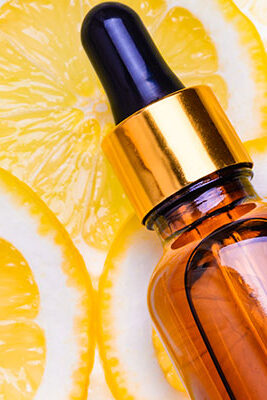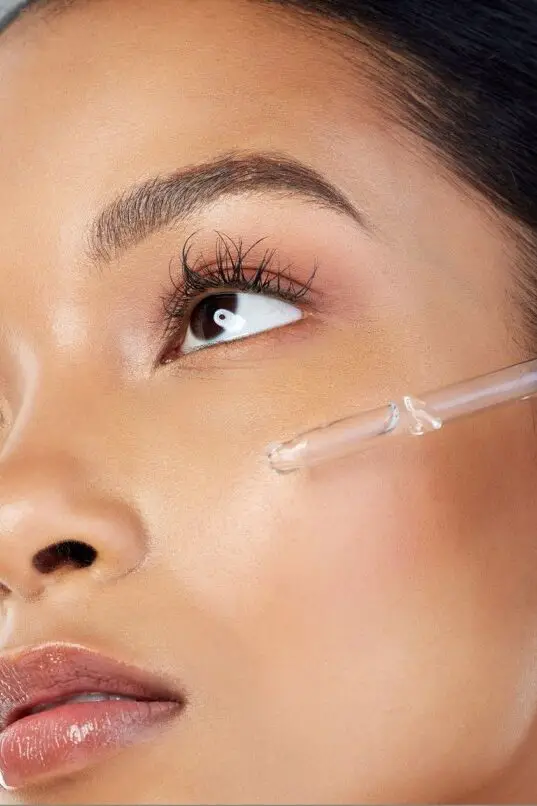Top 7 Genius Hacks To Boost Your Collagen Naturally
Collagen serves as the scaffolding of your skin, playing a crucial role in maintaining its elasticity and youthfulness.
As the most abundant protein in your body, its preservation and enhancement are vital for your overall health and appearance.
Discovering how to boost your collagen naturally is pivotal for anyone looking to rejuvenate their skin from the inside out, without resorting to invasive procedures or costly serums.
With the right knowledge and tools, you can enhance your body’s ability to regenerate this essential protein, paving the way for healthier, more resilient skin.
This post, dives into the top genius hacks to boost your collagen naturally, offering effective, natural strategies for increasing collagen and elastin, rebuilding collagen, and ensuring the best way to get collagen in your body.
Busy? Save this pin for later.

1. Consume Collagen-Boosting Foods

To boost your collagen naturally, start by incorporating a variety of protein-rich foods into your diet.
Foods like beef, chicken, fish, beans, and eggs are excellent sources of amino acids, which are the building blocks your body needs to produce collagen.
Not only do these foods help in collagen formation, but they also provide a host of other health benefits.
Adding bone broth to your diet is another fantastic way to increase your collagen intake. Made by simmering bones from beef, chicken, or fish, bone broth is rich in collagen and can be enjoyed on its own or used as a base for soups and stews.
This flavorful liquid is not only comforting but also helps in the maintenance of strong, healthy skin.
Vitamin C is crucial for collagen production. You can ensure you’re getting plenty of this vitamin by eating fruits and vegetables such as citrus fruits, red and green peppers, tomatoes, and dark green leafy vegetables like broccoli and kale.
Minerals like zinc and copper are also vital for collagen synthesis. Include foods like meats, shellfish, nuts, whole grains, and beans in your diet to get these essential nutrients.
Each of these components plays a role in maintaining the structural integrity of your skin and overall health.
Garlic, for instance, adds more than flavor to your dishes; it’s high in sulfur, a trace mineral that helps synthesize and prevent the breakdown of collagen.
Meanwhile, berries offer a significant amount of vitamin C, which is essential for collagen production. Try incorporating a variety of berries like strawberries, raspberries, blueberries, and blackberries into your diet to reap these benefits.
2. Use Topical Vitamin C

To boost your collagen naturally and improve your skin’s health, incorporating topical Vitamin C into your skincare routine is a smart move.
Known for its powerful antioxidant properties, Vitamin C helps in protecting your skin from premature aging by neutralizing free radicals.
It’s particularly effective in stimulating collagen production, which is crucial for maintaining skin elasticity and firmness.
Vitamin C Collagen Benefits
Vitamin C is not just a staple for your immune system; it’s also a critical element in skin health, acting as a collagen booster.
By stimulating collagen production, it helps to maintain the skin’s youthfulness, reducing the appearance of fine lines and wrinkles.
Regular application can also help the skin retain moisture, enhancing its overall texture and tone.
Best Vitamin C Products
When choosing a Vitamin C product, opt for serums as they are more potent and can be easily absorbed by the skin. Look for products that contain L-ascorbic acid, the most active form of Vitamin C.
It’s important to select serums that are stored in opaque or amber-colored bottles to prevent oxidation.
For those with sensitive skin, start with a lower concentration and gradually increase it to allow your skin to build tolerance.
How to Use Vitamin C Topically
To maximize the benefits of Vitamin C, apply the serum after cleansing and toning your skin. A good routine is to layer the serum under your moisturizer and sunscreen for added protection.
Applying it in the morning is ideal as it enhances the sunscreen’s effectiveness against UV damage.
For sensitive skin types, consider using it during your nighttime routine to avoid any potential redness or irritation from sun exposure.
3. Try Aloe Vera

Aloe Vera has long been celebrated for its skin-soothing properties, but did you know it can also help boost your collagen naturally?
Studies have shown that both topical application and oral intake of aloe vera gel can significantly improve the appearance of wrinkles and increase skin elasticity.
When you use aloe vera gel directly on your skin, it helps in hydrating and soothing the skin, making wrinkles less noticeable.
This is because aloe vera contains molecules called sterols, which promote the production of collagen and hyaluronic acid. These substances help your skin retain moisture and maintain a youthful appearance.
For those looking to enhance the effects, consuming aloe vera as a supplement has been shown to be beneficial as well.
Research indicates that taking aloe vera orally can lead to improved skin elasticity and increased collagen production. In clinical studies, participants experienced a noticeable reduction in facial wrinkles after consuming aloe vera gel supplements over a period of 90 days.
To incorporate aloe vera into your skincare routine, start by doing a patch test to ensure you’re not allergic.
If all goes well, cleanse your face and apply a thin layer of aloe vera gel. Leave it on for about 5 to 10 minutes before rinsing with cool water. For best results, use it daily as part of your skincare regimen.
4. Incorporate Ginseng

Ginseng Collagen Benefits
Ginseng, a traditional herb with roots deep in Asian culture, is celebrated not only for its wellness impacts but also for its significant skin benefits.
Known for its antioxidant and anti-inflammatory properties, ginseng plays a crucial role in anti-aging by promoting collagen production.
This helps maintain skin elasticity and reduces the appearance of wrinkles and fine lines. Additionally, ginseng’s ability to enhance blood circulation aids in giving your skin a vibrant, youthful glow.
How to Use Ginseng
Incorporating ginseng into your skincare routine is straightforward and can be adapted to daily use.
Start by applying ginseng-infused products after cleansing and toning your skin. For those with sensitive skin, conducting a patch test on your arm before facial application is advisable to avoid any adverse reactions.
Best Ginseng Supplements
While topical applications are beneficial, ingesting ginseng can amplify its effects. Opt for ginseng supplements to enhance your skin health from the inside out.
These are available in various forms such as capsules, teas, or powders. Ensure you choose supplements from reputable sources to avoid adulteration and achieve the best results.
Regular intake can significantly improve not only your skin’s appearance but also your overall vitality.
5. Practice Sun Protection

To boost your collagen naturally and safeguard your skin from premature aging, practicing effective sun protection is essential.
Ultraviolet (UV) light is a significant contributor to skin aging, known as photoaging, which includes symptoms like dyspigmentation, thickening of the skin, and loss of elasticity.
UV exposure leads to a cascade of skin damage, initiating free radical activity that causes oxidative stress, inflammation, and the degradation of vital skin proteins like collagen and elastin.
Sun Damage and Collagen
Exposure to UV rays accelerates the breakdown of collagen, leading to the formation of lines, wrinkles, and skin laxity.
Over time, the once uniform and organized collagen fibers become cross-linked and disorganized, exacerbating the aging process.
Regular use of sunscreen can significantly mitigate these effects, making it a crucial element in your anti-aging skincare routine.
Best Sunscreens for Collagen
Choosing the right sunscreen is vital for protecting your skin’s collagen structure. Always opt for a broad-spectrum sunscreen which guards against both UVA and UVB rays.
A minimum sun protection factor (SPF) of 30 is recommended.
For enhanced skin health, look for sunscreens that are also packed with antioxidants, which can further neutralize free radicals and support skin repair.
Sun Protection Tips
Maximize your sun protection by wearing broad-spectrum, water-resistant sunscreen every day and reapplying every two hours, or more frequently if swimming or sweating.
Cover up with UV-protective clothing, including wide-brimmed hats, sunglasses with UV protection, and long-sleeved shirts.
Try to avoid the sun during peak UV hours from 10:00 am to 4:00 pm and always seek shade when possible.
6. Use Retinoids

Retinoid Collagen Benefits
Retinoids, including forms like retinol and tretinoin, are celebrated for their profound impact on skin health, primarily through boosting collagen production.
By stimulating fibroblasts, the cells responsible for collagen synthesis, retinoids enhance skin elasticity and firmness.
They also inhibit enzymes that break down collagen and elastin, helping to maintain the skin’s structural integrity and youthful appearance.
Regular use of retinoids can visibly reduce fine lines and improve skin texture, making them a cornerstone in anti-aging skincare.
How to Use Retinoids
Incorporating retinoids into your skincare routine should be done with care to maximize benefits while minimizing potential irritation.
Start with applications every other day, gradually increasing to nightly use as your skin tolerates. It’s crucial to apply retinoids to clean skin in the evening, as they can increase sensitivity to sunlight.
Following up with a broad-spectrum sunscreen during the day is essential to protect your skin. For sensitive skin types, using a moisturizer before applying retinoid products can help mitigate dryness and irritation.
Best Retinoid Products
While prescription options like tretinoin and adapalene offer potent benefits, over-the-counter products containing retinol are also effective and widely available.
These products come in various concentrations, allowing you to start with a lower strength and build up as your skin adjusts.
It’s advisable to select formulations packaged in opaque containers to prevent degradation of the active ingredients by light exposure.
7. Stay Hydrated

Throughout this article, we’ve explored natural strategies to boost collagen production, emphasizing the importance of diet, skincare routines, and lifestyle adjustments.
From the benefits of collagen-boosting foods and vitamin C, to the impact of sun protection and retinoids, we’ve covered a comprehensive range of methods that support skin health and collagen synthesis.
These approaches not only offer a pathway to stronger, more youthful skin but also enhance overall well-being, illustrating how intertwined our dietary habits and skincare practices are with our body’s ability to maintain its vitality.
As we conclude, it’s clear that the journey to enhancing natural collagen is multifaceted, involving more than just topical treatments or dietary changes alone.
The combination of protecting the skin from environmental damage, nurturing it with the right nutrients, and using quality skincare products wisely can significantly contribute to its elasticity and youthfulness.
Conclusion
Boosting your collagen naturally isn’t just about achieving a youthful appearance; it’s about enhancing your overall health.
While aging and environmental factors like UV exposure and smoking can deplete collagen, incorporating a balanced diet and healthy lifestyle choices can significantly help maintain its production.
Remember, collagen is essential not only for skin elasticity but also for joint flexibility and wound healing.
Embrace these natural methods consistently, and you’ll likely see not just improvements in your skin, but in your overall well-being too.




